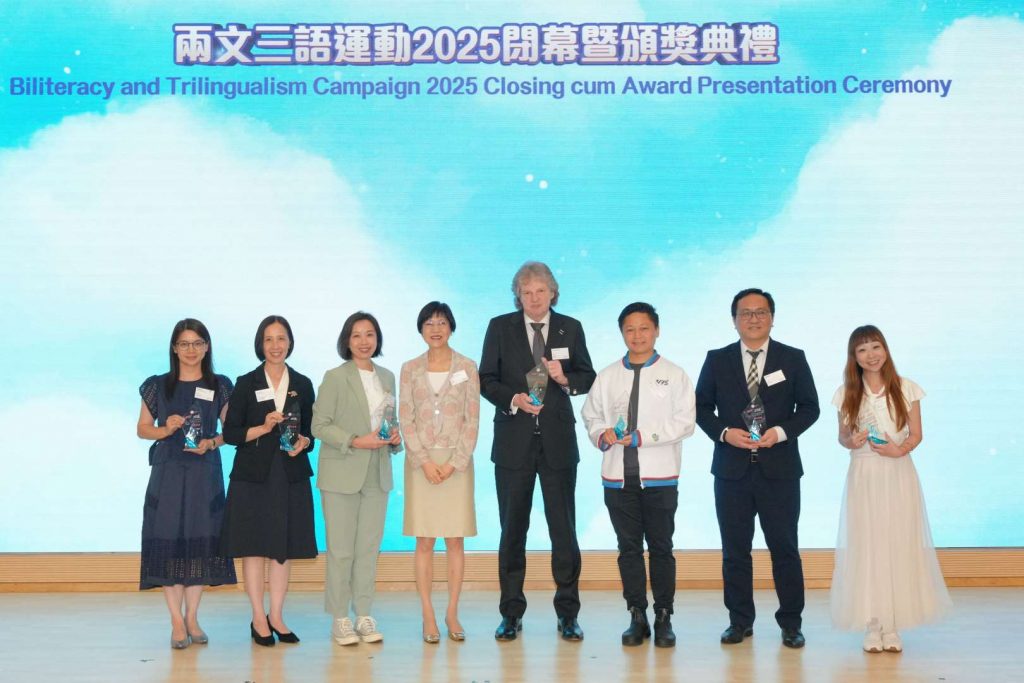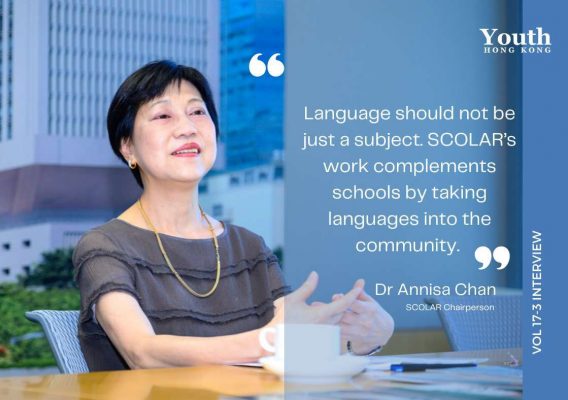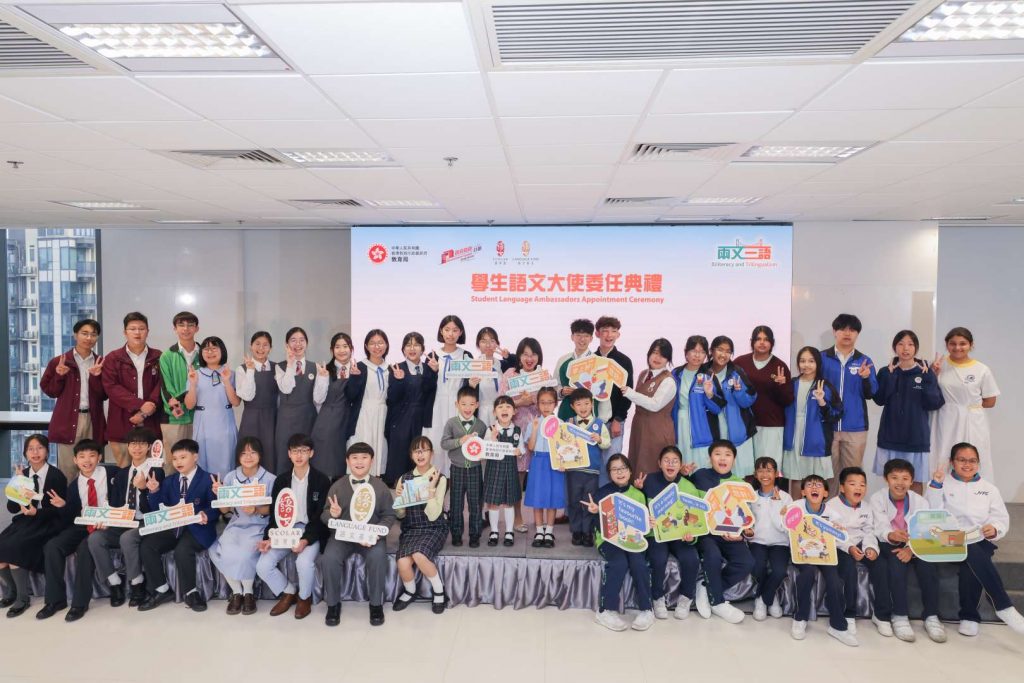Dr Annisa Chan: Making Language Learning a Fun, Dynamic and Everyday Habit
Beyond the classroom, SCOLAR is helping Hong Kong’s young people to see language ability as a bridge to other cultures and communities, as well as an essential skill for everyday life.
Learning a new language has always held a special place in Dr Annisa Chan’s heart. She still remembers her time as the Principal at St. Paul’s Co-educational College, where she introduced Arabic and Spanish as an interest class for junior secondary students.
“It was fun and interesting, and on graduation, the ‘lesson’ was enjoying an authentic Middle Eastern or Spanish meal in a Hong Kong restaurant,” she recalls. “I don’t know if the same courses still exist, but they were very popular at the time.”
Now Chairperson of the Standing Committee on Language Education and Research (SCOLAR), Dr Chan hopes to continue building a more encouraging, diverse and language-friendly environment beyond the classroom. For her, language is about communication, building relationships, reaching out beyond one’s comfort zone, and creating bridges to other nationalities, cultures and ethnicities.
Youth Trends
Having worked in Hong Kong’s education sector for decades, Dr Chan has witnessed how young people’s linguistic abilities have evolved. In her view, today’s youth are more fluent in three spoken languages than ever before.
This observation is supported by official statistics. The Census and Statistics Department reports that satisfaction with Chinese and English proficiency has improved. The percentage of employed persons who felt it necessary to further study English, Cantonese, or Putonghua fell from 25.4% in 2018 to 20.5% in 2021, reflecting increased confidence in their language abilities. Earlier research by the University of Hong Kong’s Social Sciences Research Centre found that in 2014, over 90% of those under 30 had some proficiency in both Putonghua and English, compared to about 70% in the same age group in the 2011 census.
“They are confident enough to speak out in a language that is not their mother tongue, especially when there is a friendly, welcoming, and encouraging environment,” she notes, adding that in Hong Kong, speaking three dominant languages comes naturally, something society should nurture.
While she is not worried about the daily use of Cantonese, Dr Chan is concerned about formal writing in both Chinese and English. Social media and internet slang, she warns, are eroding young people’s ability to write properly.
This phenomenon sees young people mixing Cantonese, English and Putonghua with slang and abbreviations online. While this enriches everyday expression and youth identity, it also risks widening the generation gap and undermining traditional language standards, particularly in written communication.
Recognising this, SCOLAR has supported hundreds of initiatives over the past decade to strengthen written Chinese and English. These include the School Writers’ Programme and the Hong Kong Creative Writing Programme organised by HKFYG, where students undergo several months of training before the winners’ work is published.
Adapting to Change
With its mission to improve language proficiency, SCOLAR adapts its strategies as society evolves. “As times change, our focus changes too,” Dr Chan explains. “We constantly ask ourselves: what are the most effective tactics and campaigns to meet current needs?”
One example is support for non-Chinese-speaking students. Over the past decade, SCOLAR has launched initiatives such as the Vocational Chinese Language Programme, designed to help school leavers whose first language is not Chinese to acquire practical Chinese skills and improve their employability in Hong Kong’s competitive job market. This ongoing commitment is part of SCOLAR’s broader mission to ensure inclusive, practical language education for diverse learners.
This recent focus on non-Chinese speaking residents is a necessary response to Hong Kong’s vibrant multicultural demographic landscape. According to the 2021 Population Census, Hong Kong is home to more than 600,000 people from various ethnic minority groups, constituting 8.4% of the total population. Often referred to as “Asia’s World City” due to its interconnectivity and East-meets-West geopolitical dynamic, Hong Kong has a richly diverse population, and SCOLAR is committed to promoting equal opportunities for all.

Chairperson of the SCOLAR Dr Annisa Chan, and partners at the Closing cum Award Presentation Ceremony of Biliteracy and Trilingualism Campaign 2025.
To stay relevant and foster a language-rich environment, SCOLAR recently launched the Biliteracy and Trilingualism Campaign 2025. The campaign features innovative activities such as a One-minute Video Production Competition, the appointment of Student Language Ambassadors, and the engagement of singer Hins Cheung as Campaign Ambassador.
“English is needed for everyday life and everyday communication. Activities like these are designed to bring language learning into daily life, beyond textbooks and classrooms,” says Dr Chan. “Language should not be just a school subject. By taking languages into the community, SCOLAR’s work complements what is done in schools. I hope students will gain confidence outside the classroom, worry less about mistakes and simply have fun.”
Through such initiatives, SCOLAR aims to enhance the proficiency and appreciation of biliteracy (Chinese and English) and trilingualism (Cantonese, Putonghua, and English) among students and the general public, supporting Hong Kong’s development as a vibrant, East-meets-West international cultural and educational hub.
Language in the Future
Looking ahead, SCOLAR will continue to experiment with new approaches that make language learning relevant and engaging. This includes expanding the Student Language Ambassador Scheme, thereby giving young people greater ownership in promoting a fun and inclusive language culture among their peers.
In December 2025, SCOLAR will launch a new publication, Language and You, showcasing stories, insights, and creative works from students and educators. It will highlight real-life use of languages across Hong Kong.
Together with the Education Bureau, SCOLAR is also exploring how AI can support language learning. In early July, in collaboration with Hong Kong Education City and The Hong Kong Polytechnic University, it co-hosted the first International Summit on the Use of AI in Learning and Teaching Languages and Other Subjects.
For Dr Chan, SCOLAR’s fundamental goal remains clear: to make language learning fun, dynamic, and part of everyday life. Through finding different languages on the streets, in workplaces and at home, she hopes the next generation of Hong Kong youth will see learning languages not as an academic burden, but as a tool for communicating, connecting and building bridges in today’s global village. ■



